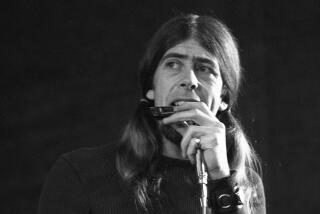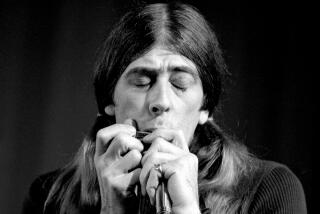O.C. POP MUSIC REVIEW : Taj Mahal and Peter Case Play Different Folk
- Share via
Taj Mahal is one of the leading conservators of the old folk-blues, while Peter Case is a good exponent of the new folk-rock. Sharing a bill Tuesday night at the Coach House, Mahal, an assured solo performer of more than 20 years’ standing, managed to make his familiar act, styles and repertoire sound refreshing. Case, still experimenting with finding the proper live vehicle, was not as consistently effective, although he drew upon strong, roots-oriented, original material.
Mahal opened and closed his set with rolling blues piano but his expertise as a finger-picking guitarist is what gave him the inventiveness and flexibility to maintain a sense of liveliness and variety. He produced a sprightly, shimmery tone on his amplified acoustic guitar that contrasted nicely with his husky, bullfrog vocals.
He put elements of the unexpected into his playing--such as the loud whams signaling gunshots during the old saloon murder story “Stagger Lee”--and into his singing, which was highlighted by his knack for shifting his tone of voice to portray different characters or emotional shades.
Rather than howling or belting, Mahal brought a convincing sense of intimacy and reflection to his blues singing. Swiveling his head from side to side as if it was bobbing atop a toy figurine rather than his large, well-muscled torso, Mahal was an animated performer even when he was singing quiet songs.
Mahal’s blues tended to be amiable: even songs about how bad the blues can hurt looked forward to better times. He involved the audience with little prodding, and they responded by singing, humming or whistling along throughout a 95-minute set built on songs that have been staples of Mahal’s repertoire for years.
The San Juan Capistrano show contained no surprises, but as Mahal noted in introducing one of his chestnuts, “Corinna,” a good old blues love song lends itself to being sung “in a way that’s exciting night after night.” From the bouncing folk guitar of “Freight Train” to the delta blues of “Come On In My Kitchen” to the reggae and calypso of music of “Johnny Too Bad” and “The Four Mills Brothers,” Mahal kept the familiar engaging.
Case, a reformed rocker who formerly led the Los Angeles band the Plimsouls, has performed as a solo troubadour over the past few years, even though he continues to use crack backing bands on his albums.
At the Coach House, he added a bassist and a drummer with mixed results. Michael Bannister’s loose slapping on the drums added a good, homespun dimension to folksy numbers such as “Travellin’ Light,” a Cajun-influenced two-step, and the blues-rocking “Old Blue Car.”
But at other times, Case could have used sharper accompaniment --including perhaps a good lead guitar player to fill in the blanks left by his own serviceable but unremarkable acoustic rhythm guitar work and harmonica blowing. Maybe bassist Duke McVinney could serve that melodic function, but he played an insignificant role in this 65-minute set.
Case’s repeated pauses to attend to guitar tuning problems brought a damaging awkwardness to the proceedings. The strongest point was his singing: He has a sturdy, forthright style that makes him sound at times like a huskier, fuller-bodied version of the Byrds’ Roger McGuinn.
While focusing most of his set on narrative songs about down-and-outers, Case neglected to play “Two Angels” and “Hidden Love,” the lovely and fervent ballads that conclude his new album (which goes by the unfortunately arch title, “The Man With The Blue Postmodern Fragmented Neo-traditionalist Guitar.”)
Every troubadour should have a couple of winning love songs like these. Case, who is lucky enough to have written them, didn’t do himself or his listeners any favors by not playing them--especially when the Coach House’s small size and attentive audiences afford the ideal circumstances to get up close and personal.
More to Read
The biggest entertainment stories
Get our big stories about Hollywood, film, television, music, arts, culture and more right in your inbox as soon as they publish.
You may occasionally receive promotional content from the Los Angeles Times.







